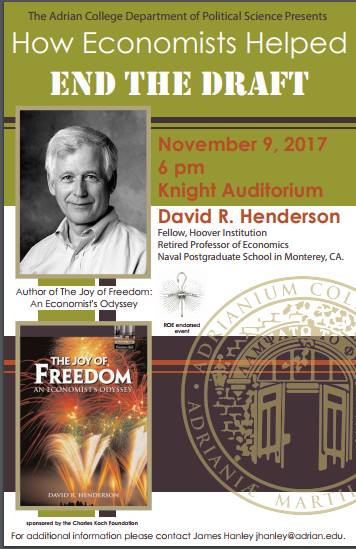At a speech that Defense Secretary Leon Panetta gave at the Naval Postgraduate School in Monterey yesterday, I posed the following question:
Good morning, Mr. Secretary. I’m David Henderson, an economics professor here in the Graduate School of Business and Public Policy.
Ohio State University professor John Mueller stated in a recent article in Foreign Affairs:
an al Qaeda computer seized in Afghanistan in 2001 indicated that the group’s budget for research on weapons of mass destruction (almost all of it focused on primitive chemical weapons work) was some $2,000 to $4,000.
In your previous job [I made a mistake here: he was already Defense Secretary when he said it but it seemed clear that these data were ones he got as CIA Director], you yourself pointed out that there are fewer than two dozen key operatives left in al Qaeda. Given our huge budget deficit, when do you say, “Enough is enough. Let’s end those wars because the costs are so much higher than the hypothetical gains.”
Here’s his answer from Larry Parsons’ report in the Monterey County Herald, which agrees with the one I remember hearing:
Responding to an NPS faculty member’s question about winding down the costly wars in Afghanistan and Iraq, Panetta responded sternly.
“Those wars will end when the individuals who have threatened this country are no longer there to threaten our country,” he said.
The goal is to leave Iraq and Afghanistan stable, secure and “in a position to build on the sacrifices that have been made,” he said.
We could do some parsing here, taking him literally, and say that Panetta is saying the wars will end when those who threatened the United States in the past are no longer there. That’s a plausible, though expensive, goal. But does anyone believe that if people in that part of the world threaten the United States in the future, he and his boss will say, “No problem: we got rid of all the past threats.” It seems clear from context that Panetta means that as long as there are threats there, the wars will continue. Which means that he is arguing for carrying on the wars forever. Although 2024 is not forever, last week, the Telegraph in the United Kingdom reported that the Afghan and U.S. governments are close to signing a deal to keep U.S. troops in Afghanistan through the end of 2024.
By the way, it was gratifying to have a number of my past students from my Cost/Benefit Analysis class stop me in the hallway or e-mail me afterward to comment that they got my point immediately because of the class I had taught them.
Cross-posted at the Library of Economics and Liberty blog.




